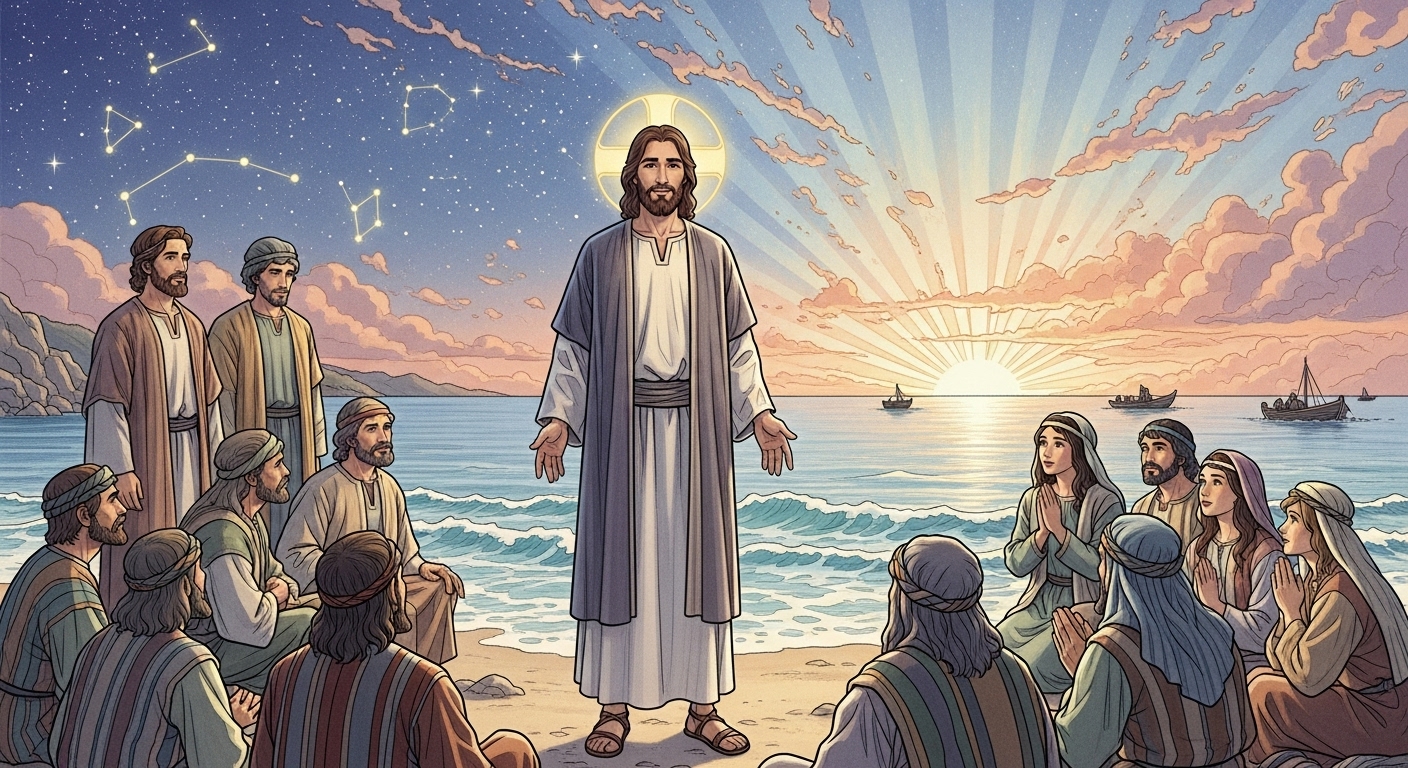Understanding The End Times: A Study On Prophecy – Revelation 22:20

1. Introduction
Have you ever watched the sky at dusk and felt a strange mix of awe and questions about what comes next? Maybe you’ve flipped through the last pages of the Bible and paused at Revelation with a lump in your throat—curious, uneasy, hopeful. You’re not alone. The idea of “end times” stirs deep emotions: fear, wonder, longing, and even comfort. This study focuses on one short, powerful verse—Revelation 22:20—and helps you understand what it means for your faith, your choices, and your hope today.
Below you’ll find clear Scripture, thoughtful explanations, practical next steps, and reflective questions to help you wrestle with prophecy in a way that builds trust in Jesus rather than anxiety. Let’s walk through it together.
📖 2. The Bible Foundation
Quote: Revelation 22:20 (NIV)
- “He who testifies to these things says, ‘Yes, I am coming soon.’ Amen. Come, Lord Jesus.”
Read on Bible Gateway: https://www.biblegateway.com/passage/?search=Revelation+22:20&version=NIV

This short verse comes at the very end of the Bible. It records a direct, emphatic promise: Jesus Himself declares He is coming again. The verse closes the book with a prayerful cry—“Come, Lord Jesus”—and an affirmation—“Yes, I am coming soon.” In context, Revelation is full of images and warnings about the last days, but this final line captures the heart: the Lord promises return and invites your longing.
In simple terms, Revelation 22:20 is a reassurance. It’s like a friend reminding you they will come back as promised and you’re invited to wait expectantly. The promise is both comforting and urgent: comforting because God’s justice and restoration are assured; urgent because readiness matters now. When you read this verse, you’re hearing the promise of Christ and the call to hope.
🧠 3. Understanding the Core Truth
The core truth of Revelation 22:20 is threefold: Jesus promises to return, His return is certain, and believers are invited to live in expectant hope. That means your faith isn’t about guessing dates or being paralyzed by fear. It’s about aligning daily life with the reality that God’s purposes will be completed.
This message matters because it shapes how you live now. End Times Prophecy isn’t primarily about timelines and signs to impress you with knowledge; it’s designed to encourage faithful living. The certainty of Christ’s return gives meaning to patience, endurance, and holiness. You’re invited to trust a future in which God makes all things right. That trust changes priorities—relationships, mercy, justice, and faithful service become expressions of readiness.
So when you read Revelation 22:20, take the main point as an encouragement: God keeps His promises, and you can live with hope.
🌊 4. Going Deeper — The Hidden Meaning

Beneath the straightforward promise in Revelation 22:20 is a deeper pastoral truth: longing is holy. The phrase “Come, Lord Jesus” is not a passive wish but an active prayer that defines Christian hope. It’s a spiritual posture that both acknowledges present suffering and anticipates redemption. The urgency—“I am coming soon”—must be balanced with the biblical reality that ‘soon’ in God’s timeline is different from ours (see 2 Peter 3:8: https://www.biblegateway.com/passage/?search=2+Peter+3:8&version=NIV).
Think of a long-awaited reunion. When you know a loved one is returning, your daily choices change—you tidy the house, you prepare food, you make time to be present. Similarly, the expectation of Christ’s return transforms ordinary choices into meaningful kingdom actions. The hidden lesson is that longing shapes virtue: patience becomes endurance, mourning becomes hope, and vigilance becomes faithful service.
A biblical example that echoes this is Paul’s teaching in 1 Thessalonians 5: they were encouraged to live soberly and be watchful because they knew the Lord’s return could come unexpectedly (1 Thessalonians 5:1-11: https://www.biblegateway.com/passage/?search=1+Thessalonians+5:1-11&version=NIV). That teaching isn’t about fear—it’s about forming character.
💡 5. Modern Connection — Relevance Today

So how does End Times Prophecy matter when you’re juggling work, family, bills, and anxiety about the world? It matters in practical, life-shaping ways:
- You prioritize love and reconciliation because you know relationships matter in God’s economy.
- You care for the vulnerable—widows, strangers, and the marginalized—since the Bible emphasizes justice and mercy, showing the heart of God as you wait.
- You live with a perspective that tempers consumerism and urgency; eternity reframes what’s important.
In modern life, prophecy can sometimes be sensationalized by headlines and pundits. But when you center on Revelation 22:20, you convert sensational curiosity into faithful living. You’ll find it easier to invest time in prayer, pursue integrity at work, and cultivate hope amidst crises. Belief in Christ’s return offers both comfort and courage: comfort for today’s wounds, courage to act for tomorrow’s renewal.
When crisis hits—job loss, illness, loss of a loved one—this promise offers a lens through which your grief gains meaning: pain is not the final word. That is a practical, day-to-day hope that informs how you speak, decide, and serve.
Related Post: Signs of Jesus’ Return: What the Bible Says
❤️ 6. Practical Application — Living the Message
You don’t need elaborate rituals to live out Revelation 22:20. Here are simple, doable steps you can start today to embody End Times Prophecy in everyday life:
- Pray regularly: Make a brief morning or evening prayer that echoes “Come, Lord Jesus” as a reminder of hope and dependence.
- Serve intentionally: Pick one consistent way to serve—volunteer once a month, help a neighbor, or support a local charity.
- Stay morally awake: Make small integrity choices—a truthful conversation, fair work practices, kindness on social media—that reflect kingdom values.
- Read Scripture in community: Join a short study group or online discussion focused on hope and practical discipleship.
- Practice stewardship: Use money, time, and gifts not only for comfort but to bless others and build lasting relationships.
These actions are not box-checking; they’re ways you rehearse readiness. Each small discipline trains your heart to live like someone expecting Jesus, not someone trying to predict the exact moment of His coming.
👉 7. 🌿 Faith Reflection Box
Take a moment to breathe and ask yourself: How does the promise of Jesus’ return change one small choice you’ll make this week?
Reflective prompts:
- Who needs my presence or forgiveness as I wait on Christ?
- Is there a habit I can start that expresses hope rather than fear?
- Where am I tempted to hoard comfort when I could share it?
Key Takeaways:
- End Times Prophecy centers on hope: Jesus promises to return—trust that reality.
- Longing is active: “Come, Lord Jesus” is a prayer that shapes your daily life.
- Live with urgency and love: readiness means service, integrity, and compassion now.
- Watchfulness is pastoral, not fearful: be alert, patient, and committed to growth.
- Community matters: journey with others who encourage faithful living as you wait.
Related Post: Unveiling The End Times: Signs Of Matthew 24″- Matthew 24:6-8
👉 8. Q&A
Q1: Does Revelation 22:20 mean the end is literally around the corner? Answer: Revelation 22:20 expresses Jesus’ certainty and closeness—“I am coming soon.” This “soon” communicates urgency and hope. However, Scripture also teaches that God’s timing doesn’t match human clocks (see 2 Peter 3:8: https://www.biblegateway.com/passage/?search=2+Peter+3:8&version=NIV). The practical takeaway is not to fix a date but to live with readiness and faithfulness. When you expect Jesus, your priorities shift: you love more, forgive more, and steward resources with eternity in view. That posture matters more than pinpointing a day.
Q2: How should you talk to friends who are fearful about the end times? Answer: Meet fear with empathy and Scripture. Listen first—fear often masks deeper hurts. Then gently point to the comfort of Christ’s promise in Revelation 22:20 (https://www.biblegateway.com/passage/?search=Revelation+22:20&version=NIV) and practical habits that build peace—prayer, community, and service. Encourage small steps, like a prayer routine or joining a supportive group. If you want a concrete resource on praying through anxiety, check this helpful guide: https://biblestorieshub.com/how-to-pray-for-peace-when-your-mind-feels-overwhelmed/. Your presence and steady testimony often speak louder than abstract predictions.
Q3: Will signs in the world tell you when Jesus is coming? Answer: Jesus spoke about signs—wars, natural disturbances, moral confusion—but He also warned against becoming fixated on sign-hunting (Matthew 24:36: https://www.biblegateway.com/passage/?search=Matthew+24:36&version=NIV). Signs can remind you to take the message seriously, but they aren’t a timetable you can rely on for reassurance. Instead, focus on spiritual preparation: pray, serve, and grow in holiness. When signs stir anxiety, return to simple truths—God is faithful, Jesus will come, and your mission continues.
Q4: How do you balance hope for Christ’s return with dealing with real suffering now? Answer: Balancing hope and suffering is at the heart of Christian faith. The promise of Christ’s return doesn’t negate present pain; it gives it context. Scripture invites lament (e.g., Psalms) and also offers hope (Romans 8:18: https://www.biblegateway.com/passage/?search=Romans+8:18&version=NIV). You can grieve honestly while holding the promise that suffering will be transformed. Practical steps: find a faith community that listens, practice honest prayer, and engage in small acts of love. Those practices help you suffer with hope rather than despair.
Q5: What should you pray for regarding the return of Christ? Answer: Pray with longing and wisdom: ask for Christ’s return in ways that shape you—teach you patience, fuel acts of compassion, and strengthen your witness. Pray “Come, Lord Jesus” from Revelation 22:20 (https://www.biblegateway.com/passage/?search=Revelation+22:20&version=NIV), but also pray for the readiness of others, the comfort of those in pain, and the courage to act justly. Short, regular prayers recalibrate your heart to live expectantly and lovingly in the present.
🙏 9. Conclusion & Reflection
As you close this study, let Revelation 22:20 move you from curiosity to faithful action. The promise—“Yes, I am coming soon. Amen. Come, Lord Jesus.”—is both a comfort and a call. It reminds you that the story isn’t finished and that God’s justice and restoration will be complete. That reality frees you to love boldly, forgive generously, and live with a hopeful urgency that honors Jesus.
A short prayer: Lord Jesus, thank You for Your promise to return. Help me live with hopeful expectancy, serve others with compassion, and keep my heart fixed on You. When fear creeps in, remind me that Your timing is perfect and Your purposes are good. Amen.

Explore More
For further reading and encouragement, check out these posts:
👉 7 Bible Verses About Faith in Hard Times
👉 Job’s Faith: What We Can Learn From His Trials
👉 How To Trust God When Everything Falls Apart
👉 Why God Allows Suffering – A Biblical Perspective
👉 Faith Over Fear: How To Stand Strong In Uncertain Seasons
👉 How To Encourage Someone Struggling With Their Faith
👉 5 Prayers for Strength When You’re Feeling Weak

📘 Jesus and the Woman Caught in Adultery – Grace and Mercy Over Judgement
A powerful retelling of John 8:1-11. This book brings to life the depth of forgiveness, mercy, and God’s unwavering love.
👉 Check it now on Amazon 🛒💥
🔥 “Every great message deserves a home online.” 🌍💬🏡
Don’t let your calling stay hidden. Start a Christian blog or website using Hostinger — with 99.9% uptime, a free domain, and SSL, your voice can shine for God’s glory anytime, anywhere.
💥 Begin today. 🛒 Try it RISK-FREE! ✅
✝️ “Your body is God’s temple — care for it with purpose.” 💪💖🏛️
Renew your energy and restore balance naturally. Mitolyn helps support a healthy metabolism, giving you the vitality to live out God’s calling with strength and confidence.
🔥 Unlock Your Metabolic Power! ⚡Burn More Calories & Feel Great With Mitolyn. 💪
👉 Start Today. 🚀 Check Price Now. 🛒💰
💰 As a ClickBank & Amazon Affiliate, I earn from qualifying purchases.
📖 Acknowledgment: All Bible verses referenced in this article were accessed via Bible Gateway (or Bible Hub).
🚀 Want to explore more? 👉 Dive into our new post on Why Jesus? and experience the 🔥 life-changing truth of the Gospel!








